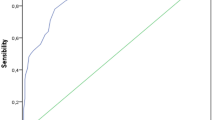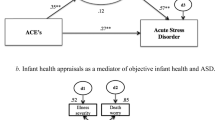Abstract
OBJECTIVE: We evaluated the construct validity of the Perinatal Posttraumatic Stress Disorder Questionnaire.
STUDY DESIGN: Using a convergent/divergent validity design and two data sources (traditional survey and World Wide Web), 121 high-risk and 52 low-risk mothers answered four questionnaires.
RESULTS: High-risk mothers scored higher than low-risk mothers on all measures of emotional distress. There were significant positive correlations among the convergent measures of emotional distress, which were significantly larger than any correlation of the divergent measure with a convergent measure. Scores on the Perinatal Posttraumatic Stress Disorder Questionnaire were positively related to mothers seeking formal psychotherapy for their childbirth experiences. Questionnaire responses were not related to data source.
CONCLUSION: The Perinatal Posttraumatic Stress Disorder Questionnaire is a useful tool for identifying significant emotional distress in mothers during the postnatal period.
This is a preview of subscription content, access via your institution
Access options
Subscribe to this journal
Receive 12 print issues and online access
$259.00 per year
only $21.58 per issue
Buy this article
- Purchase on Springer Link
- Instant access to full article PDF
Prices may be subject to local taxes which are calculated during checkout
Similar content being viewed by others
References
Ballard CG, Stanley AK, Brockington IF . Post-traumatic stress disorder (PTSD) after childbirth Br J Psychiatry 1995 166: 525–8
Fones C . Posttraumatic stress disorder occurring after painful childbirth J Nerv Ment Dis 1996 184: 195–6
Moleman N, van der Hart O, van der Kolk BA . The partus stress reaction: a neglected etiological factor in postpartum psychiatric disorders J Nerv Ment Dis 1992 180: 271
Ryding EL, Wijma B, Wijma K . Posttraumatic stress reactions after emergency cesarean section Acta Obstet Gynecol Scand 1997 76: 856–61
Affleck G, Tennen H, Rowe J, Higgins P . Mothers' remembrances of newborn intensive care: a predictive study J Pediatr Psychol 1990 15: 67–81
Benfield DG, Leib SA, Reuter J . Grief response of parents after referral of the critically ill newborn to a regional center N Engl J Med 1976 294: 975–8
Blackburn A, Lowen L . Impact of an infant's premature birth on the grandparents and parents J Obstet Gynecol Neonatal Nurs 1985 14: 173–8
DeMier RL, Hynan MT, Hatfield RF, Varner MW, Harris HB, Maniello RL . A measurement model of perinatal stressors: identifying risk for postnatal emotional distress in mothers of high-risk infants J Clin Psychol 2000 56: 89–100
Fajardo B . Brief intervention with parents in the special care nursery Neonatal Netw 1988 6: 23–30
Hynan MT . The Pain of Premature Parents: A Psychological Guide for Coping Lanham, MD: University Press of America 1987
Hynan MT . The emotional reactions of parents to their premature baby Prenat Perinat Psychol J 1991 6: 85–95
Jeffcoate JA, Humphrey ME, Lloyd JK . Role perception and response to stress in fathers and mothers following pre-term delivery Soc Sci Med 1979 13: 139–45
Kaplan DM, Mason EA . Maternal reactions to premature birth viewed as an acute emotional disorder Am J Orthopsychiatry 1959 30: 539–52
Light MJ, Sheridan MS . Psychosocial impact of emergency apnea Am J Dis Child 1987 141: 668–71
Philipp C . The role of recollected anxiety in parental adaptation to low birthweight infants Child Psychiatry Hum Dev 1983 13: 239–48
Silcock A . Crises in parents of prematures: an Australian study Br J Dev Psychol 1984 2: 257–68
DeMier RL, Hynan MT, Harris HB, Maniello RL . Perinatal stressors as predictors of symptoms of posttraumatic stress in mothers of high-risk infants J Perinatol 1996 16: 276–80
Quinnell FA, Hynan MT . Convergent and discriminant validity of the Perinatal PTSD Questionnaire (PPQ) J Trauma Stress 1999 12: 193–9
Grace MC, Green BL, Lindy JD, Leonard AC . The Buffalo Creek disaster: A 14-year follow-up In: Wilson JP, Raphael B, editors International Handbook of Traumatic Stress Syndromes New York: Plenum 1993 p 441–9
Horowitz MJ, Wilner NR, Alvarez W . Impact of Event Scale: a measure of subjective distress Psychosom Med 1979 41: 209–18
Beck AT, Steer RA, Brown GK . Beck Depression Inventory 2nd ed San Antonio, TX: The Psychological Corporation 1996
Costa PT Jr, McCrae RR . Revised NEO Personality Inventory (NEO PI-R) and NEO Five Factor Inventory (NEO-FFI) Odessa, FL: Psychological Assessment Resources 1992
Miller DC . Handbook of Research Design and Social Measurement 5th ed New York: Longman 1991
American Psychiatric Association. Diagnostic and Statistical Manual of Mental Disorders 3rd ed, revised Washington, DC: American Psychiatric Association 1987
Briere J, Elliot DM . Clinical utility of the Impact of Event Scale: psychometrics in the general population Assessment 1998 5: 171–80
Affleck G, Tennen H, Gershman K . Cognitive adaptations to high-risk infants: the search for mastery, meaning, and protection from future harm Am J Ment Defic 1985 89: 653–6
Blank K, Perry S . Relationship of psychological processes during delirium to outcome Am J Psychiatry 1984 141: 843–7
Cohen L, Roth S . Coping with abortion J Hum Stress 1984 10: 140–5
Horowitz MJ, Marmar C, Weiss DS, DeWitt KN, Rosenbaum R . Brief psychotherapy of bereavement reactions: the relationship of process to outcome Arch Gen Psychiatry 1984 41: 438–48
Perkins DV, Tebes JA . Genuine versus simulated responses on the Impact of Event Scale Psychol Rep 1984 54: 575–8
Briere J . Trauma Symptom Inventory Odessa, FL: Psychological Assessment Resources 1995
McCrae RR, Costa PT Jr . Joint factors in self-reports and ratings: neuroticism, extraversion, and openness to experience Pers Individ Differ 1983 4: 245–55
McCrae RR . Creativity, divergent thinking, and openness to experience J Pers Soc Psychol 1987 46: 1258–65
Beck AT, Steer RA . Manual for the Beck Hopelessness Scale San Antonio, TX: The Psychological Corporation 1988
Beck AT, Kovacs M, Weissman A . Assessment of suicidal intention: the scale for suicide ideation J Consult Clin Psychol 1979 47: 343–52
Beck AT, Steer RA . Manual for the Beck Anxiety Inventory San Antonio, TX: The Psychological Corporation 1990
Hamilton M . A rating scale for depression J Neurol Neurosurg Psychiatry 1960 23: 56–62
Hamilton M . The assessment of anxiety by rating Br J Med Psychol 1959 32: 50–5
SPSS. Statistical Package for the Social Sciences Chicago: SPSS 1999
Hynan MT . The Perinatal Posttraumatic Stress Disorder (PTSD) Questionnaire (PPQ) In: Zalaquett CP, Wood RJ, editors Evaluating Stress: A Book of Resources Lanham, MD: Scarecrow Press 1998 2: 199–220
van der Kolk BA, McFarlene AC, Weisaeth L . Traumatic Stress: The Effects of Overwhelming Experience on Mind, Body, and Society New York: Guilford Press 1996
Jospeh KS, Kramer MS, Marcoux S et al. Determinants of preterm birth rates in Canada from 1981 through 1983 and from 1992 through 1994 N Engl J Med 1998 339: 1434–9
Steegers-Theunissen RP, Zwertbroek WM, Huisjes AJ, Kanhai HH, Bruinse HW, Merkus HM . Multiple birth prevalence in The Netherlands. Impact of maternal age and assisted reproductive techniques J Reprod Med 1998 43: 173–9
Buchanan T, Smith JL . Using the internet for psychological research: personality testing on the world wide web Br J Psychol 1999 90: 125–44
Thompson RJ, Goldstein RF, Oehler JM, Gustafson KE, Catlett AT, Brazy JE . Developmental outcome of very low birthweight infants as a function of biological risk and psychosocial risk Dev Behav Pediatr 1994 15: 232–8
Murray L, Cooper PJ . Postpartum Depression and Child Development New York: Guilford Press 1997
Sameroff AJ, Chandler MJ . Transactional regulation and early intervention In: Meisels SJ, Shonkoff JP, editors Handbook of Early Childhood Intervention New York: Cambridge Univ. Press 1990 p 119–91
Meyer EC, Garcia-Coll CT, Lester BM, Boukydis Z, McDonough SM, Oh W . Family based intervention improves maternal psychological well-being and feeding interaction of preterm infants Pediatrics 1994 241–6
Pridham KF, Limbo RK, Schroeder M, Thoyre S, Van Riper M . Guided participation and development of caregiving competencies for families of low birth weight infants J Adv Nurs 1999 948–58
Acknowledgements
This study was based on the Master's thesis of the first author. We appreciate the helpful comments of Vincent Adesso, Sue Lima, and Robyn Ridley.
Author information
Authors and Affiliations
Rights and permissions
About this article
Cite this article
Callahan, J., Hynan, M. Identifying Mothers at Risk for Postnatal Emotional Distress: Further Evidence for the Validity of the Perinatal Posttraumatic Stress Disorder Questionnaire. J Perinatol 22, 448–454 (2002). https://doi.org/10.1038/sj.jp.7210783
Published:
Issue Date:
DOI: https://doi.org/10.1038/sj.jp.7210783
This article is cited by
-
Psychometric Properties of Parent Outcome Measures Used in RCTs of Antenatal and Early Years Parent Programs: A Systematic Review
Clinical Child and Family Psychology Review (2019)
-
Biopsychosocial risks of parental care for high-risk neonates: implications for evidence-based parental counseling
Journal of Perinatology (2012)
-
Modification of the Perinatal PTSD Questionnaire to enhance clinical utility
Journal of Perinatology (2006)
-
The HPA axis and perinatal depression: a hypothesis
Archives of Women's Mental Health (2006)



